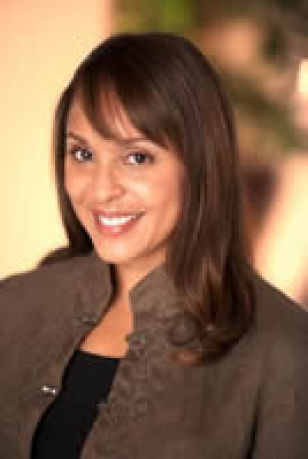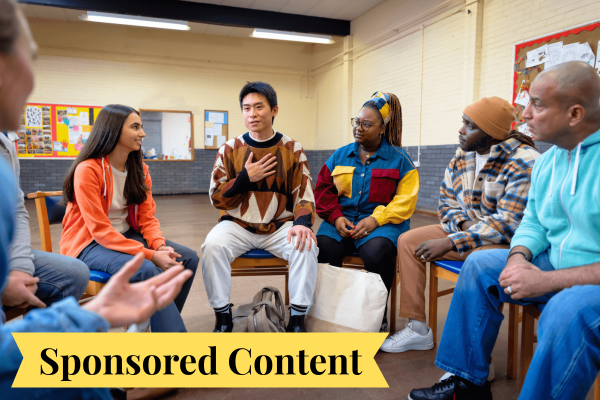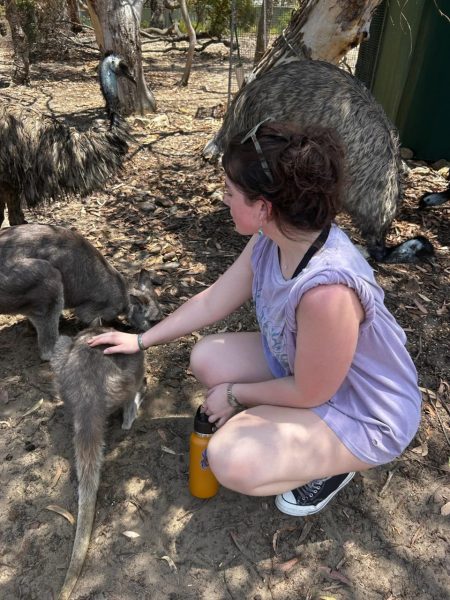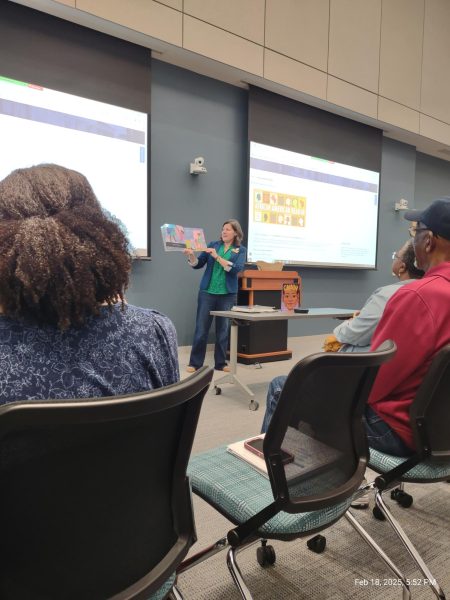Writers Week 2013 features U.S. Poet Laureate

Natasha Trethewey is the United State’s current Poet Laureate. During Writers Week, she gave a reading from her poetry collection, “Thrall,” and answered questions related to her craft.
This year’s Writers Week brought several much-loved authors to UNC Wilmington, including a writer who represents our nation: keynote speaker and U.S. Poet Laureate Natasha Trethewey.
As part of the week’s events, Trethewey held a Q&A on Thursday Nov. 7, followed by an evening reading. Fans and aspiring poets asked her questions about her job, her creative process and her most recent collection, “Thrall” (Houghton Mifflin Harcourt 2012). Trethewey’s ability to form strong yet fluent poetry was evident in her expressive responses to the group’s questions.
At both events, Trethewey described Miguel Cabrera’s casta paintings, which portray the social and racial classification of 17th century Mexico, as the influence for many of the poems in her most recent collection. “The moment I saw them, I was enthralled,” Trethewey said. “It was obvious in some ways, because it represents those mixed blood unions, those families. In a way, it was like looking at my own family.”
Being of mixed ethnicity, Trethewey said she set out to write about race in “Thrall.” Although her previously published works have been received as racial-based poetry, Trethewey feels her writing was more about history.
“Race is a part of my home to the extent that race is a part of American history. Indeed, it’s the very thread that runs through American history,” she said.
One student, wondering how Trethewey became a poet, asked her about the influence of her family. Trethewey claimed that both “mad Mississippi” and the death of her mother “hurt her into poetry.”
Trethewey also spoke about taking moments to “go back to being a poet.” Specifically, she spoke about her artistic process for “Thrall’s” first poem, “Elegy for My Father,” which she read on Thursday night.
“‘Elegy [for My Father]’ is there in some ways to establish the quarrels within myself,” she said. “In the moment in that poem, it’s to say I will make use of this moment with my father to make art, which means I’m not really in the moment. It seems a little ruthless, but I think sometimes we have to be.”
In addition to being the U.S. Poet Laureate, Trethewey is also a professor of English and creative writing at Emory University in Atlanta, Ga. MFA student and poet Kate Johnsen, who was formerly Trethewey’s student, gave her a heart-felt introduction at the Q&A.
Johnsen told a story about her experience at Emory, explaining that Trethewey told her class, “If the muse of poetry arrived, we had her permission to be in complete service to the poem.” Johnsen called Trethewey both a friend and mentor.
As a student in the Writers Week course, which is offered to undergraduate and graduate students in the creative writing department interested in organizing the event, Johnsen was the catalyst in inviting Trethewey to visit UNCW as the keynote speaker.
“We regularly bring in first-class, nationally-recognized people,” said creative writing professor Mark Cox, who teaches the Writers Week course. “Clearly, she holds an important literary position of the nation at this point. That makes her special.”
Cox said that by bringing in well-known authors, students get intimate access to successful writers. It is also a way for the department to contribute a literary element to the larger, cultural arts community.
Cox also explained that previous Writers Weeks have been planned thematically, such as last year’s, which had a concentration on the digital age. However, this year, things changed.
“We returned to really thinking about issues of craft,” Cox said.
As both a professor and a promoter of poetry, Trethewey contributed to the discussion, and Johnsen felt that the Q&A sanctioned that contribution.
“She didn’t come in with a set sort of agenda. Because the audience was made up of a lot of creative writing students and writers, they were interested in asking about questions of craft. It was mostly student and participant driven,” Johnsen said.
The Poet Laureate was able to connect with all genre writers, including fiction and non-fiction, because, Johnsen said, Trethewey wants readers to understand her poems during the first read by prioritizing clarity.
“I remember she would always say ‘Poetry is saying exactly what we mean and meaning something else,’” Johnsen said.











